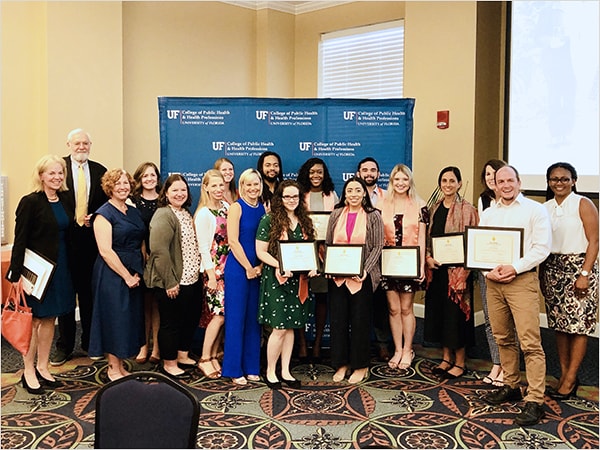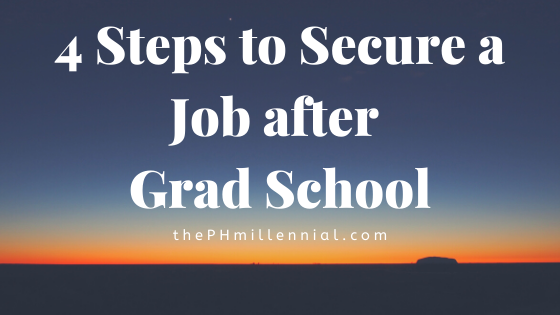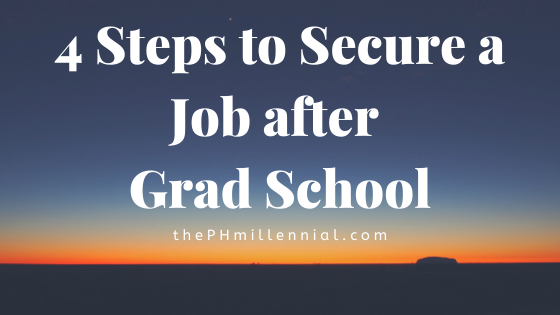My MPH degree helped me get a fellowship by giving me the knowledge, skills, experiences and opportunities I needed.
FYI MPH is the Masters of Public Health degree.
I want to walk through what are the important things I took away during my time in my MPH program that allowed me to be able to get a Community Health Fellowship before graduating.
Support The Public Health Millennial on BuyMeACoffee
I’d like to preface this article saying that I was a pre-medicine Biology Major before I started my Masters of Public Health degree. I entered the field of Public Health not knowing anything about it.
Also I didn’t have any real work experience (or internship) until the summer after my first year in my MPH program. Up until then I had only volunteered and been football (soccer) referee for intramural sports at UF.
DOWNLOAD my resume I used to apply to my fellowship BELOW.
Courses I Took
I went to the University of Florida’s Master of Public Health program. And I was in the concentration of Management and Policy.
Taught me about Public Health
My first semester was an eye-opening one where I was able to learn about public health. It created the foundational knowledge for me to go on and succeed throughout my MPH program.
The courses I took were:
- US Healthcare Systems
- Principles of Epidemiology in Public Health
- Statistical methods in Health Sciences
- Psychological, Social, & Behavioral Issues in Public Health
I credit all of these courses for sparking my deep interest in the field. And gave me the foundational knowledge that other courses could build off of afterwards.
Taught me Knowledge & Skills Needed
Though all of my courses taught knowledge, only some gave me knowledge and skills that were applicable to my fellowship position.
These are
- Community Assessment and Participation
Taught me what a Community Health Needs Assessment was and gave me the skills to conduct one from start to finish. Additionally, I gained the knowledge survey design and development.
- Evidence-Based Management of Public Health Programs
Taught me how to set up an evaluation plan to evaluate public health programs. Evaluation is one skill I use frequently in my fellowship so course proved very important for the work I currently do. It also taught me how to critically analyze the data that programs use for more insightful evaluation decisions.
- Systems Thinking For Public Health
Taught me how to think differently on how large and complex systems work and how this impacted public health. We all think that we have the best ideas for making fixing issues. However we don’t think about the unintended consequences or how the change we make can affect other things in the system. This really opened up my mind to understanding that working at the systems level is great, but you have to be intentional in making changes to get the improvement you want. And even then, you are never sure what will happen when making an intervention.
- Introduction to Management of Health Services Organizations
Taught me organizational practices and principles as applied through the lens of management. I learnt how various health services organizations operate and I enjoyed the case study approach to learning. This course allowed me to enhance my public speaking abilities and taught me critical thinking skills that managers need to have in order to be successful.
- International Health System Delivery
Taught me how various international health systems worked. Which allowed me to compare the efficiencies and inefficiencies among different systems. This big picture class really was a great culmination of the knowledge that I learnt in various other courses during my MPH. This course was also strictly presentations and papers so I was able to better hone in on my research & development and presentation skills.
(Related: 9 Keys for Success in Grad School)

People I Met
MPH Students
One of the most undervalued things I don’t hear people talk about while studying their MPH is talking to other fellow MPH candidates.
Too often you end up staying with the same people in your concentration or specific classes. But let me tell you that there is a lot of value in just talking to other students about their thoughts on different topics and issues in public health. Or even if you speak to them to find out what their career interest are.
Public health is a robust field with so many different career paths and areas of study.
Don’t get bogged down in your own path so much that you forget to learn from others around you. Engage other students in class and in team projects. I can’t tell you how much I learnt about the public health field from doing this.
There is also the case for when there are alumni or other public health professionals coming to speak at events. Go to them, ask questions, and connect with them afterwards. You never know what insights you will gain at from just showing up and engaging.

At APHA
One of my best experiences while getting my MPH was attending the American Public Health Association Conference.
The sheer number of people and knowledge to attain at APHA is amazing. I recommend it as a must for any one interested in pursuing a career in public health. Not only can you hear about new insights in the field of public health, but the potential to network and learn about others (students and professionals) paths and interest is amazing.
Additionally, I was able to attend the ASPPH Student Leadership Workshops both years I attended the conference. This was expensed through my MPH program which was a great added bonus for attending APHA. This allowed me to have engaging and meaningful learning with other MPH and PhD students around the country.
(Related: 6 Reasons you Should Attend APHA as a MPH Student)
Mentors
I did not have any official mentors during my MPH program. However I do believe that the consistent interactions I had with certain individuals really helped guide and assist me to where I am today.
Apart from this list I gained a lot of value from speaking with different TA’s in courses I was in. TA’s usually have very interesting stories to tell and can always help you with things other than just the class you are in. Don’t miss out on the value they can bring to your life.
These 4 individuals are:
- Dr. Cindy Prins – UF MPH Program Director
- Jeff Feller – CEO of WellFlorida Council and Professor
- Lindsey Redding – Preceptor at WellFlorida (Director of Community Initiatives) and Professor
- Sheena Pryce-Fegumps – Internship Coordinator at UF MPH Program and advisor to the Public Health Student Association (PHSA)
As president of PHSA, I sat on the Public Health Policy Committee for UF’s College of Public Health. Here I had interactions with Dr. Prins and Jeff Feller which gave me a closer relationship.
Dr. Prins was always there for support in leading PHSA as well as a great resource for knowledge acquisition and MPH success. Though I did not have any academic courses with her, I gained a lot from the continual interaction. And Dr. Prins was able to talk about my leadership skills and abilities when it was time for me to apply for fellowships.
Jeff Feller taught me the courses: 1) Health Policy and, 2) Evidenced-Based Management of Public Health Programs. Jeff was the one that solicited an internship at WellFlorida which I took him up on. Health policy gave me the knowledge and tools to get an internship with Suwannee River AHEC/Florida Rural Health Association. And Evidenced-Based Management has taught me skills of program evaluation and critical thinking in public health which has proven very useful in my work as a fellow.
Lindsey Redding taught me the Community Assessment and Participation course. This course really helped me understand Community Health Needs Assessments (CHNA) and Survey Development & Design. When I did begin my internship at WellFlorida Council, Lindsey was my direct supervisor. By doing this I was able to work directly on several CHNAs, survey development, and assist in focus group facilitation. These are all invaluable skills that tie directly to the work I do now as a fellow.
Sheena Pryce-Fegumps assisted PHSA with anything and everything that we needed while giving us direction. By being on PHSA Eboard I was able to really dig in and understand what my leadership style was and it really helped me to be a leader among my peers. Sheena had supported me while I was able to hone in on the invaluable skills of leadership and without this I would have never been as successful as I was as President.
Of these 4 individuals, I asked the first three to be references for me for my application to the Community Health Fellowship Position. By getting direct and continual interactions, I was able to learn a lot and grow while they gave me the opportunities to succeed throughout my MPH program.
Internships
I did two internships during my time as a MPH student. These two internships really allowed me to showcase the new knowledge and skills I gained from my MPH courses.
(Related: The Guide to Getting a Good Internship in Graduate School (MPH))
WellFlorida
I started working at WellFlorida in May 2018 and worked there until May 2019. Though I do consider this an internship, it was more of a part-time staff member position.
The biggest thing I would say I learnt from this internship would be professionalism in the workplace and CHNA know-how.
I also learned about managing my time and producing work that I was proud of.
My claim to fame in this position would be the research and development of the Marion County Opioid Whitepaper. I used this whitepaper as my Special Project for my MPH program. Additionally, I worked on a portion of the Shands Lake Shore 2018 Needs Assessment which was a huge talking point in my fellowship interview.
Another less liked skill I picked up here was data entry. Though this is not a favorite of mine, it taught me how to find and enter various forms of data which I would say is important in the public health field.
Suwannee River AHEC/Florida Rural Health Association
I began my internship here in November 2018 and ended in May 2019. It was a dual internship, some of the work I did pertained to Suwannee River AHEC while others dealt with the Florida Rural Health Association.
This was a fully remote internship with a few physical check-ins, but mostly over the phone or email. Through this position I was able to write a Rural Health Whitepaper focusing on health inequities faced by rural vs urban Floridians. This project was very extensive as it covered many different indicators in relation to the social determinants of health. It also gave me the chance to present twice.
I was supposed to work in this position with another MPH student, but an opportunity opened up out of state for her and therefore she was unable. So the work that 2 interns were suppose to do, I had to do by myself.
I was able to learn from this how to manage my time and set up deadlines to ensure that I was able to complete this work while also doing work for my other internship and my MPH program. (and as a referee)
Additionally, I worked on creating a document to help Florida citizens in rural areas advocate for issues that were important to them.
Public Speaking
I think that public speaking is a vitally important skill to learn during your time in public health. Communication is important and therefore you need to know how to present and speak on topics that are important for the work you do.
No matter what job you take in public health, you are more likely than not going to have to speak up on matters or talk in meetings. Therefore ensure that you are at least decently comfortable with public speaking.
@Florida Rural Health Association Conference
I was able to present and be on a panel at the Florida Rural Health Association just because I researched and developed the Rural vs Urban Health Whitepaper. This was awesome as I didn’t have to submit an abstract and thus had nothing to lose.
I think this conference was important for me to get under my belt since it wasn’t a really big one. There were around 100 attendees.
Not only was I able to present, but I did a good job on answering the questions that were fielded by attendees.
This small conference allowed me to build greater confidence in my public speaking abilities and to be able to speak at bigger conferences.
@Rotarary Conference
I was asked to speak at the Rotary District 6960 Conference from my speaking at the Florida Rural Health Association. Networking?
The only thing different about this presentation was that it was two presenters presenting together. So there were some additions I had to make to cater to the other speaker’s presentation on healthcare transformation. Which allowed me the chance to learn how to collaborate and present with someone online as he was in a different city.
Special Project Presentation
I did my special project presentation for my MPH program on the Marion County Opioid Whitepaper I produced.
One cool thing here was that I was able to choose recommendations based on what I knew, evidence-based and best-practices. This was extremely rewarding since what I recommended would actually have an impact on how Marion County would address the opioid epidemic.
Being able to present on this project, really allowed me to harness the learning I have done through the MPH program and my internships to present at a high level.
These three presentation opportunities truly allowed me to better craft my personal public speaking skill and gave me the chance to display what I have learnt.
Other Noteworthy Mentions
President of PHSA
In short, my experience being the president of the Public Health Student Association increased my leadership ability incredibly.
It allowed me to understand strategic planning, organizational relationship building, and leading a team of my peers to successfully reach goals we had set.
Also this position gave the chance to meet and interact with many students from all different concentrations during my MPH.
Global Health Case Competition
I took part in the 2018 UF Global Health Case Competition. This was a competition that spanned students from undergraduate to PhD candidates from various fields related to health.
The structure of the competition was that you have a team of 5 students and have to find a timely, and monetarily feasible solution to address a global health issue. The 2018 issue was HIV/AIDS in South Africa. The catch was that we had something like 60 hours to meet with our group and come up with a solution to the issue and present on it.
This competition was extremely fun and gave me the ability to collaborate with students who had different levels of knowledge and fields of study to come up with a coherent solution. And then present this on a competitive stage.
Though my team did not place for this competition, I found this experience very rewarding as I learnt a lot. This is how real-world solutions are formed, through collaboration from many different stakeholders.
Half-Marathon
Nowadays, applicants are referring to accomplishments that would not have been acceptable a few years ago. I included my half-marathon in my resume when I applied to my fellowship for 2 reasons.
- Shows that I can train and work hard to get to a result
- Displays that fitness and health is important to me
Interestingly enough, when I was doing my second round of interviewing with the CEO of the foundation I work at now. My half-marathon time came up and we spoke about this for a few minutes. You could imagine how relieved and happy this made me feel.
Including “unorthodox” accomplishments in your resume or application can show your personality apart from work experience.
So if you think it is relevant and there is no way it can hurt your application process, I’d say to add it.
Conclusion
In concluding, my MPH gave me the knowledge, skills, tools and support to get a fellowship. By being proactive, I was able to take on many new opportunities that helped me grow.
This article walked through:
- Courses I Took
- People I Met
- Internships
- Public Speaking
- Other Noteworthy Mentions
If you would like to know more information, please feel free to reach out to me. I will try to be as helpful and answer any questions you have.
Getting a fellowship after graduate school is something that should be strategically planned out. Thus you will increase your chances of landing it.
What struck you as the most valuable information in this article?


